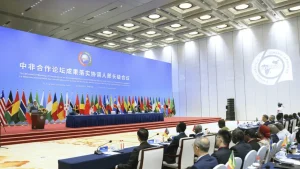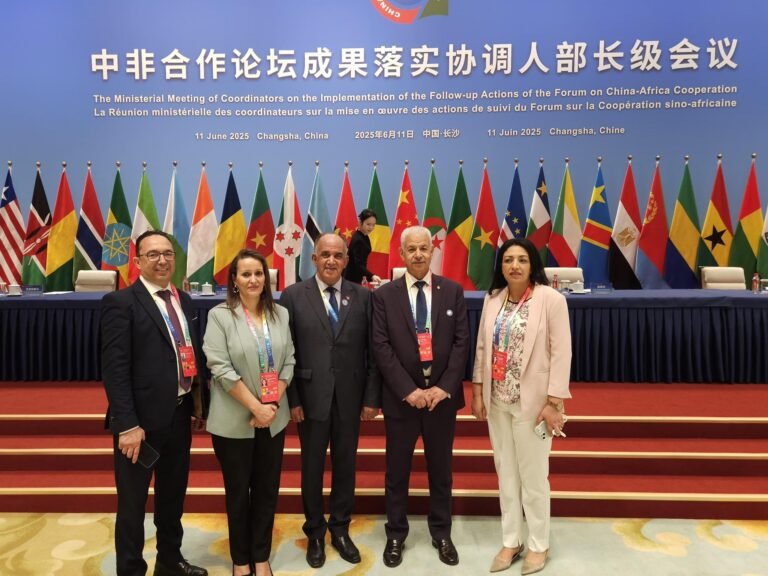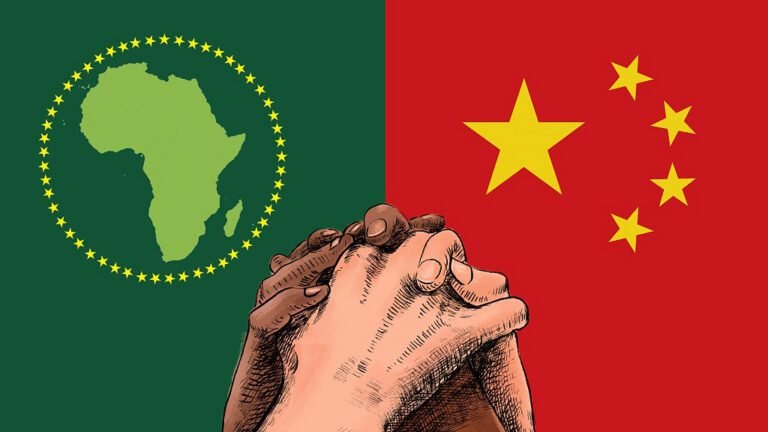مرحباً بكم في جايس للتجارة الدولية

عُقد الاجتماع الوزاري للمنسقين المعنيين بتنفيذ إجراءات متابعة أعمال منتدى التعاون الصيني الأفريقي (FOCAC) في 11 يونيو 2025، في تشانغشا، مقاطعة هونان، الصين. جمع هذا الاجتماع الرفيع المستوى وزير الخارجية الصيني وانغ يي ووزراء الخارجية من جميع أنحاء أفريقيا لتعزيز الالتزامات المتعلقة بالتعاون الاقتصادي وتطوير البنية التحتية والتضامن متعدد الأطراف. وفيما يلي تحليل تفصيلي للنتائج والإعلانات الرئيسية للحدث.
1. ارتباطات دبلوماسية رفيعة المستوى
وأجرى وزير الخارجية الصيني وانغ يي محادثات ثنائية مع العديد من نظرائه الأفارقة، مؤكداً التزام الصين بتعميق الشراكات. وشملت المناقشات الرئيسية ما يلي:
ناميبيا وبوتسوانا: ركزت المناقشات على التصنيع ومكافحة الحمائية ومواءمة استراتيجيات التنمية مع مبادرة الحزام والطريق الصينية.
كينيا: أكد وانغ يي على تنفيذ توافق الآراء الذي تم التوصل إليه في المحادثات السابقة على مستوى القادة، وتعزيز الثقة المتبادلة، ودعم أهداف كينيا التنموية. أكد الرئيس الكيني موساليا مودافادي على التمسك بـ مبدأ الصين الواحدة وتعهدوا بتعاون أقوى في التجارة والبنية التحتية.
السنغال: واتفق الجانبان على التمسك بالتعددية وتوسيع فرص الاستثمار، حيث رحب الرئيس السنغالي ياسين فال بمشاركة الصين في مشاريع التحديث.
تنزانيا: أثنى وانغ على تنفيذ تنزانيا الفعال لنتائج منتدى التعاون الاقتصادي لدول وسط أفريقيا، لا سيما في مجال البنية التحتية (مثل تنشيط خط السكك الحديدية بين تنزانيا وزامبيا) والتجارة (فوائد عدم وجود تعريفات جمركية).
2. إعلان تشانغشا: الالتزامات الرئيسية
أسفر الاجتماع عن إعلان تشانغشا الصيني الأفريقي بشأن دعم التضامن والتعاون بين الصين وأفريقيا في الجنوب العالميالتي أوجزت
A. التعاون التجاري الاقتصادي
- توسيع نطاق الإعفاء من الرسوم الجمركية: تعهدت الصين بتمديد المعاملة الجمركية الصفرية لـ 100% من خطوط التعريفة الجمركية للجميع 53 دولة أفريقية بعلاقات دبلوماسية (باستثناء إسواتيني، التي تعترف بتايوان). ويعتمد ذلك على المزايا الحالية لأقل البلدان نمواً مثل تنزانيا وأوغندا.
- نمو التجارة: التجارة الثنائية التي تم التوصل إليها $292 مليار في عام 2024مع تقديم الصين لإجراءات جمركية مبسطة ووصول السلع الأفريقية إلى الأسواق.
B. معارضة الأحادية
وانتقد الإعلان التعريفات الجمركية الحمائية الأمريكية (على سبيل المثال، 50% على ليسوتو، و38% على بوتسوانا) ودعا إلى مفاوضات تجارية متعددة الأطراف متكافئة بموجب أطر منظمة التجارة العالمية.
C. البنية التحتية والتحديث
"إجراءات الشراكة العشرة لـ FOCAC" (على سبيل المثال، الطاقة الخضراء، والاقتصاد الرقمي) تمت الموافقة عليها لتتماشى مع جدول أعمال 2063.
وتم تسليط الضوء على مشاريع مثل خط السكك الحديدية بين تنزانيا وزامبيا وتوسعات مطار أوغندا كنماذج للتعاون بين الصين وأفريقيا.
3. استجابة أفريقيا والخطوات المستقبلية
إن الاتحاد الأفريقي دعمت الصين مبادرة التنمية العالميةالتأكيد على الجهود المشتركة في الحد من الفقر والتصنيع.
كينيا يهدف إلى وضع اللمسات الأخيرة على اتفاقية التجارة مع الصين بحلول يونيو 2025 لتأمين امتيازات التصدير.
جنوب أفريقيا وأثنى آخرون على دور FOCAC في برامج فيروس نقص المناعة البشرية/الإيدز والطاقة والتدريب على المهارات.
رؤية موحدة لجنوب الكرة الأرضية
عزز اجتماع تشانغشا التضامن بين الصين وأفريقيا وسط التفتت الاقتصادي العالمي. من خلال الجمع بين تخفيف التعريفة الجمركية، والاستثمار في البنية التحتية، والدعوة المناهضة للحماية، فإن كلا الجانبين يضعان نفسيهما كقائدين لـ جدول أعمال التنمية في الجنوب العالمي. قمة FOCAC القادمة في أبوجا، نيجيريا (26 يونيو 2025) ستعزز هذه الأهداف.









